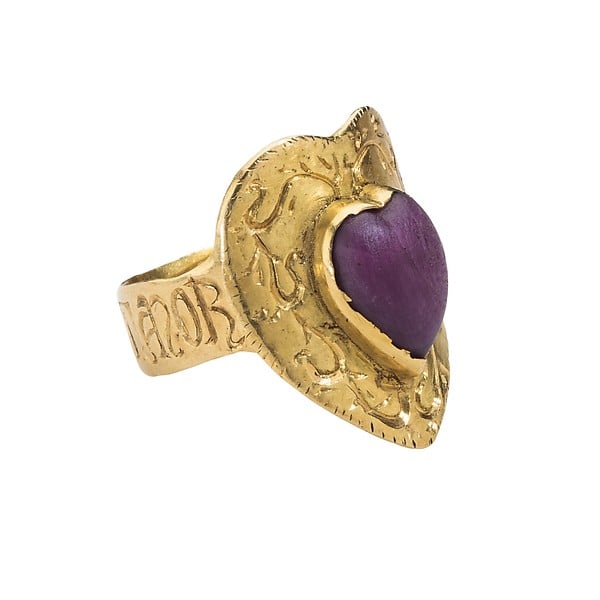
Photo: courtesy of the Metropolitan Museum of Art.
A Goldsmith in his Shop
Petrus Christus
(Netherlandish, Baarle-Hertog (Baerle-Duc), active by 1444–died 1475/76 Bruges)
Date: 1449.
Photo: courtesy of the Metropolitan Museum of Art.
A new exhibition at the Cloisters in Manhattan, “Treasures and Talismans: Rings From the Griffin Collection,” put together by C. Griffith Mann, curator of the Department of Medieval Art and the Cloisters, explores the subtle meanings behind beloved pieces of jewelry.
A number of ancient and medieval rings, on long-term loan to the museum, are shown in a wider historical and cultural context in the exhibition. Displayed alongside the jewels is a curated selection of paintings and sculptures borrowed from the museum’s Greek and Roman Art, European Paintings, and Robert Lehman Collection.
Gothic Love Ring “Corte Porta Amor”
Date: 14th century.
Photo: courtesy of the Metropolitan Museum of Art.
Color is an important factor in antique jewelry, in some cases more than a stone’s clarity. This can be seen in a 14th century Italian gothic love ring, “Corte Porta Amor,” in which a heart-shaped ruby is nestled into a gold ring which is inscribed with “The Heart Brings Love to You” in Latin.
Although by today’s standards the opaque stone may look a bit dull, the deep color nonetheless translates its messages of love to viewers across the centuries.
Two-Finger Ring
Date: early 6th century.
Photo: courtesy of Metropoltian Museum of Art.
Covered Beaker
Date: ca. 1470.
Photo: courtesy of Metropolitan Museum of Art.
Double Gemstone Ring
Date: ca. 300.
Photo: courtesy of Metropolitan Museum of Art.
Ring Brooch
Date: 1250–1300.
Photo: courtesy of Metropolitan Museum of Art.
Covered Beaker
Date: ca. 1325–50 (vessel); ca. 1340–60
Cusped Ring
Date: 15th century.
Photo: courtesy of the Metropolitan Museum of Art.
Inscribed Sapphire Ring
Date: late 14th century.
Photo: courtesy of the Metropolitan Museum of Art.
Portrait of a Woman of the Slosgin Family of Cologne
Barthel Bruyn the Younger
(German, ca. 1530–before 1610)
Date: 1557.
Photo: courtesy of the Metropolitan Museum of Art.
Gemstone Ring. Date: 12th and 13th century.
Photo: courtesy of the Metropolitan Museum of Art.
Octahedral Diamond Ring
Date: second half 3rd–early 4th century.
Photo: courtesy of Metropolitan Museum of Art.
Attributed to Hans Brosamer
(German, active by 1536, probably died 1552).
Photo: courtesy of the Metropolitan Museum of Art.
Double Gemstone Ring
Date: ca. 300.
Photo: courtesy of the Metropolitan Museum of Art.
Related stories:
Sarah Jessica Parker Super-Jewel at Sotheby’s Hong Kong
New World Record for Jewelery Auction Set in Geneva
Koons Purses and Hirst Jewelry in Our Last-Minute Holiday Gift Guide